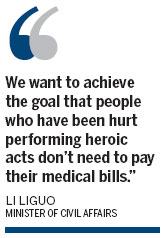
When Li Boya, an intern with the railway police, tried to stop a middle-aged man from jumping onto the rails as a train approached, his life changed forever.
Both of the 20-year-old's legs were crushed as he heroically tried to save the man in Changli county, North China's Hebei province, on July 9.
Li Song, Li's father, who runs a village clinic in Henan province, said on Tuesday that his son has undergone several operations and remains hospitalized in Qinhuangdao in Hebei. The family will have to take out a loan to pay the expensive medical fees without an official subsidy, he said.
"I have heard from the hospital that the medical costs have added up to more than 200,000 yuan ($31,400). It's too much for us," said the father.

However, Li and his family are feeling relieved after the government reiterated that a social security network will be established for people who are injured when performing acts of heroism. The new policy for acts of heroism was discussed in a video conference jointly held by seven ministry-level departments, including the ministries of health and civil affairs, on Tuesday.
The State Council released regulations on Thursday that set out principles for different government departments to jointly guarantee the rights of good Samaritans. As a result, officials from the seven government agencies each took on various responsibilities to help families of those who performed heroic acts.
Guo Yanhong, deputy director of the Ministry of Health's medical administration division, said hospitals nationwide should arrange their best medical teams to treat people who have been seriously hurt when protecting the rights and wealth of the public and other individuals.
She also stressed that hospitals are banned from denying treatment to heroic patients who cannot afford their medical expenses.
For those who are financially burdened to pay their long-term treatment fees after reimbursement, the Ministry of Civil Affairs will also help by providing medical aid subsidies, said Li Liguo, minister of civil affairs.
"We want to achieve the goal that people who have been hurt performing heroic acts don't need to pay their medical bills," Li said.
The regulations also stipulate that when people are badly hurt or even killed when performing brave acts, local governments should facilitate their children's access to education.
Liu Limin, vice-minister of education, said at the conference that children of those disabled or killed when performing heroic acts will be granted additional marks in high school and university enrollment exams.
If their families are poor, local educational departments should reduce or remove the tuition fees of their children, he said.
Xiang Mingchao in Zhengzhou contributed to this story.
hedan@chinadaily.com.cn







